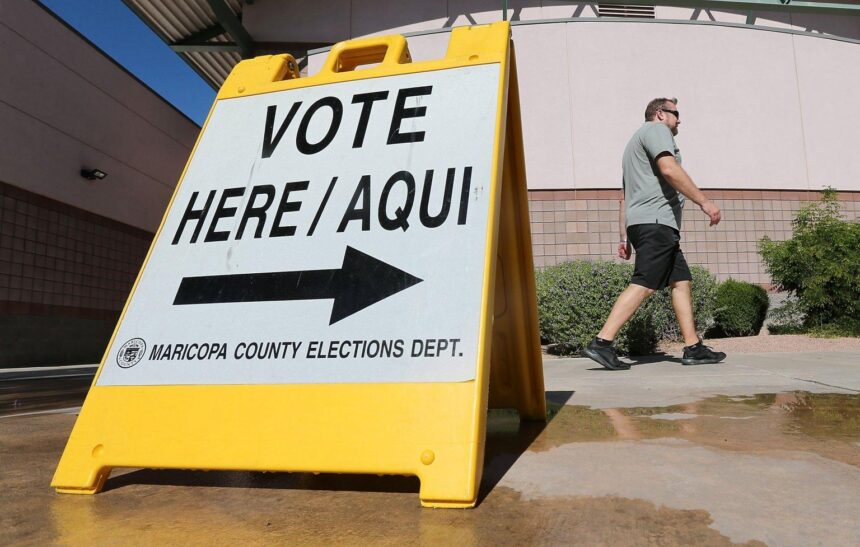Man Escapes Jail Time After Casting Ballots in Both Arizona and Nevada During 2020 Election
A recent legal case involving a man who illegally voted in the 2020 presidential election in both Arizona and Nevada has concluded without a prison sentence.Despite the serious nature of the offense, the individual was sentenced to probation and community service, avoiding incarceration. This case attracted meaningful attention amid ongoing debates about election security and cross-state voting regulations.
Essential facts about the incident include:
- The double voting occurred during early voting and absentee ballot periods, which initially allowed the duplicate votes to go undetected.
- Election officials uncovered the violation through routine cross-referencing of voter databases between states.
- The case has reignited conversations about the robustness of voter verification systems and the challenges of preventing multi-state voting fraud.
| Case Element | Details |
|---|---|
| Charges | Two counts of illegal voting |
| Sentence | 18 months probation, 200 hours community service |
| Prison Time | None imposed |
| Broader Impact | Increased focus on multi-state voter registration oversight |
Examining the Court’s Reasoning Behind the Lenient Sentence in Double Voting Case
Legal analysts have identified several critical factors that influenced the judge’s decision to issue a non-custodial sentence in this double voting case. The absence of a prior criminal record and ambiguous intent to deliberately manipulate the election process were pivotal considerations. The court appeared to prioritize rehabilitation and proportionality over punitive incarceration.
Key elements that shaped the sentencing outcome:
- The defendant’s full cooperation during the investigation process.
- Limited evidence suggesting intentional fraud or significant harm to election integrity.
- Potential negative effects of imprisonment on the defendant’s family and employment status.
- Judicial precedents favoring probation and community service in comparable election-related offenses.
| Consideration | Effect on Sentencing |
|---|---|
| Criminal History | None, supporting leniency |
| Intent to Defraud | Unclear, reducing severity |
| Cooperation Level | High, positively influencing outcome |
| Legal Precedents | Community penalties preferred |
The Consequences of Double Voting on Election Trust and Security: Expert Insights
Election authorities and scholars have weighed in on the ramifications of casting multiple votes in a single election cycle. Although illegal and possibly damaging to public confidence, experts stress that such cases are generally isolated incidents rather than evidence of systemic fraud. Double voting challenges the accuracy of election outcomes and tests the effectiveness of safeguards designed to uphold transparency and fairness. Nonetheless, experts caution against extrapolating these rare events to broader claims of election rigging, noting that modern electoral systems incorporate multiple layers of protection to detect and prevent duplicate voting.
Addressing double voting requires a multifaceted approach, combining legal enforcement, technological innovation, and administrative vigilance. Below is a summary of expert perspectives on the issue and strategies to mitigate risks:
- Legal consequences: Range from monetary penalties to imprisonment, depending on jurisdiction and intent.
- Technological safeguards: Enhanced voter ID verification and interstate data sharing protocols.
- Maintaining public trust: Transparent investigations and clear interaction are essential.
| Aspect | Level of Impact | Mitigation Strategy |
|---|---|---|
| Public Confidence in Elections | High | Greater transparency and accountability |
| Legal Enforcement | Moderate | Consistent and clear request of laws |
| Integrity of Voting Systems | High | Improved cross-jurisdictional data integration |
Strategies to Bolster Voter Verification and Prevent Election Fraud
To effectively deter fraudulent voting, election systems must adopt extensive verification techniques that blend advanced technology with human oversight. Biometric authentication methods, such as iris scans or voice recognition, offer promising solutions by uniquely verifying voter identities and minimizing impersonation risks. Furthermore, implementing real-time, nationwide voter registration cross-checks can significantly reduce the chances of individuals voting in multiple states undetected.
In addition to technological upgrades, ongoing voter education and transparency initiatives are vital.Election officials might consider the following measures:
- Regular audits of voter registries to identify and eliminate duplicate or invalid entries.
- Public reporting tools that enable citizens to flag suspicious voting activities promptly.
- Enhanced training programs for election workers to better recognize and handle potential fraud cases.
| Approach | Advantages | Implementation Difficulty |
|---|---|---|
| Biometric Authentication | Highly accurate voter identification | Moderate to High |
| Nationwide Voter Database Integration | Prevents multi-state voting attempts | High |
| Voter Awareness Campaigns | Increases public understanding and compliance | Low |
| Poll Worker Education | Improves detection and response to fraud | Moderate |
Final Thoughts on Upholding Election Integrity and Accountability
This case highlights the ongoing challenges in safeguarding election integrity and the complexities involved in prosecuting voter fraud. While authorities remain vigilant in investigating and addressing such violations, the outcome underscores the delicate balance between enforcing laws and ensuring fair, proportionate justice. As election security continues to be a national priority, maintaining rigorous verification processes and fostering public trust are essential to preserving the democratic process.










